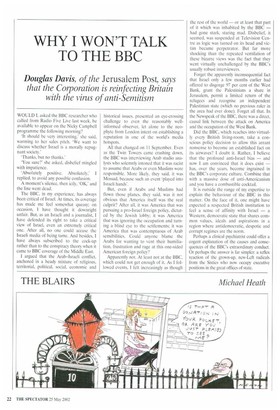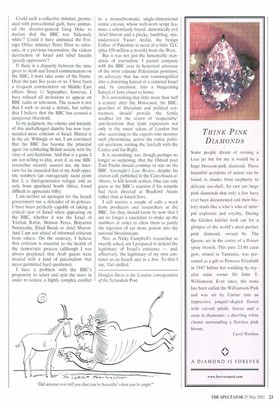WHY I WON'T TALK TO THE BBC
Douglas Davis, of the Jerusalem Post, says
that the Corporation is reinfecting Britain with the virus of anti-Semitism
WOULD I. asked the BBC researcher who called from Radio Five Live last week, be available to appear on the Nicky Campbell programme the following morning?
'It should be very interesting,' she said, warming to her sales pitch. 'We want to discuss whether Israel is a morally repugnant society.'
'Thanks, but no thanks.'
'You sure?' she asked, disbelief mingled with impatience.
'Absolutely positive. Absolutely,' I replied, to avoid any possible confusion.
A moment's silence, then icily, 'OK,' and the line went dead.
The BBC, in my experience, has always been critical of Israel. At times, its coverage has made me feel somewhat queasy; on occasion, I have thought it downright unfair. But, as an Israeli and a journalist, I have defended its right to take a critical view of Israel, even an extremely critical one. After all, no one could accuse the Israeli media of being tame. And besides, I have always subscribed to the cock-up rather than to the conspiracy theory when it came to BBC coverage of the Middle East.
I argued that the Arab-Israeli conflict, anchored in a heady mixture of religious, territorial, political, social, economic and historical issues, presented an eye-crossing challenge to even the reasonably wellinformed observer, let alone to the neophyte from London intent on establishing a reputation in one of the world's media hotspots.
All that changed on 11 September. Even as the Twin Towers came crashing down, the BBC was interviewing Arab studio analysts who solemnly intoned that it was racist to assume that Arabs or even Muslims were responsible. More likely, they said, it was Mossad, because such an event 'played into Israeli hands'.
But, even if Arabs and Muslims had flown those planes, they said, was it not obvious that America itself was the real culprit? After all, it was America that was pursuing a pro-Israel foreign policy, dictated by the Jewish lobby; it was America that was ignoring the occupation and turning a blind eye to the settlements; it was America that was contemptuous of Arab sensibilities. Could anyone blame the Arabs for wanting to vent their humiliation, frustration and rage at this one-sided American foreign policy?
Apparently not, At least not at the BBC, which could not get enough of it. As I followed events, I felt increasingly as though the rest of the world — or at least that part of it which was inhabited by the BBC — had gone stark, staring mad. Disbelief, it seemed, was suspended at Television Centre as logic was turned on its head and victim became perpetrator. But far more shocking than the repeated ventilation of these bizarre views was the fact that they went virtually unchallenged by the BBC's usually robust interviewers.
Forget the apparently inconsequential fact that Israel only a few months earlier had offered to disgorge 97 per cent of the West Bank, grant the Palestinians a share in Jerusalem, permit a limited return of the refugees and recognise an independent Palestinian state (which no previous ruler in the area had ever done). Forget all that. In the Newspeak of the BBC, there was a direct, causal link between the attack on America and the occupation of the West Bank.
Did the BBC, which reaches into virtually every British living-room, take a conscious policy decision to allow this arrant nonsense to become an established fact on its airwaves? I doubt it. Rather, I believe that the profound anti-Israel bias — and now I am convinced that it does exist — has, over the years, become ingrained in the BBC's corporate culture. Combine that with a massive dose of anti-Americanism and you have a combustible cocktail.
It is outside the range of my expertise to explain the behaviour of the BBC in this matter. On the face of it, one might have expected a respected British institution to feel a sense of affinity with Israel — a Western, democratic state that shares common values, ideals and aspirations in a region where antidemocratic, despotic and corrupt regimes are the norm.
Perhaps a clinical psychiatrist could offer a cogent explanation of the causes and consequences of the BBC's extraordinary conduct. Or perhaps the answer is far simpler: a reflex reaction of the grown-up, new-Left radicals from the Sixties who now occupy executive positions in the great offices of state. Could such a collective mindset, permeated with post-colonial guilt, have animated the director-general Greg Dyke to declare that the BBC was 'hideously white'? Could it have animated the Foreign Office minister Peter Hain to advocate, in a previous incarnation, the violent destruction of Israel and label Israelis 'greedy oppressors'?
If there is a disparity between the time given to Arab and Israeli commentators on the BBC, I must take some of the blame. Over the past five years or so, I have been a frequent commentator on Middle East affairs. Since 11 September, however, I have refused all invitations to appear on BBC radio or television. The reason is not that I wish to avoid a debate, but rather that I believe that the BBC has crossed a dangerous threshold.
In my judgment, the volume and intensity of this unchallenged diatribe has now transcended mere criticism of Israel, Hatred is in the air. Wittingly or not, I am convinced that the BBC has become the principal agent for reinfecting British society with the virus of anti-Semitism. And that is a game I am not willing to play, even if, as one BBC researcher recently assured me, my interview fee far exceeded that of my Arab opposite numbers (an outrageously racist point that I, a third-generation refugee and an exile from apartheid South Africa, found difficult to appreciate fully).
I am neither an apologist for the Israeli government nor a defender of its policies. I have been perfectly capable of taking a critical view of Israel when appearing on the BBC, whether it was the Israel of Yitzhak Rabin, Shimon Peres, Binyamin Netanyahu, Ehud Barak or Arid l Sharon. And I am not afraid of informed criticism from others. On the contrary, I believe that criticism is essential to the health of the democratic process (although I was always perplexed that Arab guests were treated with a kind of paternalism that never permitted hard questions).
I have a problem with the BBC's propensity to select and spin the news in order to reduce a highly complex conflict to a monochromatic, single-dimensional comic cut-out, whose well-worn script features a relentlessly brutal, demonically evil Arid l Sharon and a plucky, bumbling. misunderstood Yasser Arafat, the benign Father of Palestine in need of a little TLC (plus S50 million a month) from the West.
But it was not just the lamentable standards of journalism. I parted company with the BBC over its hysterical advocacy of the most extreme Palestinian positions; an advocacy that has now transmogrified into a distorting hatred of a criminal Israel and. by extension, into a burgeoning hatred of Jews closer to home.
It is astonishing that little more than half a century after the Holocaust. the BBC, guardian of liberalism and political correctness, should provide the fertile seedbed for the return of 'respectable' anti-Semitism that finds expression not only in the smart salons of London but also, according to the experts who monitor such phenomena, across the entire political spectrum, uniting the far-Left with the Centre and far-Right.
It is astonishing, too, though perhaps no longer so surprising, that the Oxford poet Tom Paulin should continue to star on the BBC New.snight's Late Review, despite his clarion call, published in the Cairo-based alAhram, to kill Jewish settlers. One can only guess at the BBC's reaction if his remarks had been directed at Bradford Asians rather than at Israeli Jews.
I still receive a couple of calls a week from producers and researchers at the BBC, but they should know by now that I am no longer a candidate to make up the numbers in order to allow them to justify the injection of yet more poison into the national bloodstream.
Nor, as Nicky Campbell's researcher so sweetly asked, am I prepared to defend the legitimacy of Israel's existence — and, effectively, the legitimacy of my own existence as an Israeli and as a Jew, To that I say, 'Get stuffed.'
Douglas Davis is the London correspondent of the Jerusalem Post.























































































 Previous page
Previous page